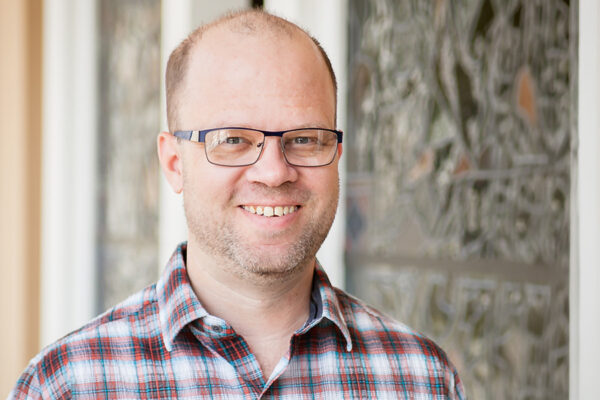In her own words: Worth and productivity

Editor’s note: Lisa Powell is professor in and chair of the theology department at St. Ambrose University.
The first sermon I preached was during college, inspired by 2 Timothy 1:12: “I am not ashamed, for I know the one in whom I have put my trust.” The sermon centered around the idea that the only measure of success worth pursuing was intimacy with God. I might not measure up in any of the categories deemed valuable by society but I would be unashamed because that was not Christian success. At the time I probably felt most acutely the pressure to get married and have children, as I understood this to be the mark of success for women in the culture in which I was raised. Today measures are more middle class and middle aged: rank, income, excelling children, diversified retirement accounts, and new publications to my name. Despite my passionate assertion at 21, my values have not entirely withstood the force of a society that places ultimate value on production rather than relationship.
I’ve been thinking a lot about our measures of success recently as Covid-19 has radically changed the educational landscape. In the midst of a global crisis, university students across the country packed up their belongings and moved away from campus, maybe to homes and families well equipped to accommodate them and their ongoing online courses — or maybe not.
Faculty were forced to think deeply about what it means to teach justly in a time of upheaval, uncertainty, and fear. Educators the world over are asking themselves and each other: what are ethical expectations at this time? What learning outcomes truly matter? What does it mean to be a successful student in this class at this moment? If education is about formation, what are we hoping to instill in these students and how are modeling it? Questions we should always be asking, but are re-evaluating our answers with new intensity.
I’m proud that St. Ambrose University, where I teach, has adopted a generous pass/no pass policy for students this semester, which will surely ease some of the stress and pressure around grades for many of our students. Ambrose also quickly issued a statement after its decision to move all classes online that it will refund room and board for the remainder of the semester, even though operating budgets were established with that revenue in mind. These responses are just. And so are all the efforts to accommodate the differing needs of our students.
These adjustments acknowledge the full humanity of our students, that they are more than minds that produce objects for evaluation. Their access and schedules differ radically: some are parents with kids at home all day with them, some are caring for younger siblings while parents are still working, others are sharing computers with siblings, or children, or parents now working from home, and some are working long hours because of loss of parental income or at their family’s business. Some no longer have bedrooms at home, and some return to spaces of trauma and abuse. We are endeavoring to respond with compassion, with adjusted workloads and different assignments to accommodate not just an online format, but the lives our students are living now, as best we can. We are trying to foster much-needed community without inflexibly demanding time. Of course, our students have always had differing needs, schedules, and access, and we should always be endeavoring to affirm their complex lives through flexibility and compassion. This too is justice.
Disability activists have been trying to get us to hear this for decades. The disability community has long been warning us about the dangers of evaluating human worth on productivity. And Jesus did too, in his own way. He showed us God’s preference for those that society doesn’t value, for the nobodies. He condemned wealth, elitism, and worldly measures of success. Jesus didn’t have a home; he was dependent upon the care and support of others. And he rejected the status that marriage and fatherhood would have afforded him in his day. He demonstrated the power of the powerless and the ultimate worth of the least of these.
The abrupt halt to the economy, the stay at home orders, and the proliferation of Zoom conferences the world over, have exposed our collective system of valuation to be shallow and worthless. Today we are living in Jesus’ parables. The seats of honor are offered to the tireless grocery store clerk and the ER nurse in a homemade mask. We are the man who tore down barns to build bigger ones to store up even more for himself, whom God called “You fool!” And we are the rich man tormented in loneliness and envy of the beggar Lazarus, who is cozied up on Abraham’s bosom. May this trauma shake us out of the capitalist trance that measures human worth by productivity, and awaken us to the invaluable worth of intimacy and connection. Our hunger for relationship is exposed and insatiable. The titles and hierarchies of success grow transparent, and we sit agape, in awe at our shared humanity. May we stay awake, and like the wise bridesmaids be alert to recognize Christ, the groom, in the face of each other.





Jana Baltimore
I just read your your amazing article this morning during my quiet time. It was so moving that I hope to print it out and keep it in my bible. These are such precarious times and your message certainly helped me gain a better understanding of …”what would Jesus want” and a feeling of peace, as I continue to live my life in social distancing but still be available to connect to others in need.
Victoria Felger
An exquisite piece, filled with truth and thought provoking notions. You made my eyes leak! Thank you!
Debbie Case
Your words of wisdom are thought provoking and carry with them a banner of truth. The truth about how far off course we have all been driven by what others think and not by what God thinks and how He values our relationship with him. May we learn from this experience that the value of a person is not an interpretation of what they do, but rather a description of the person they are in our society as a child of God. Thank you for your words of wisdom. Beautifully written in every way!
anke maass
Just wow!!! that is all